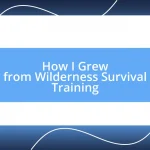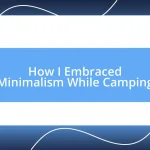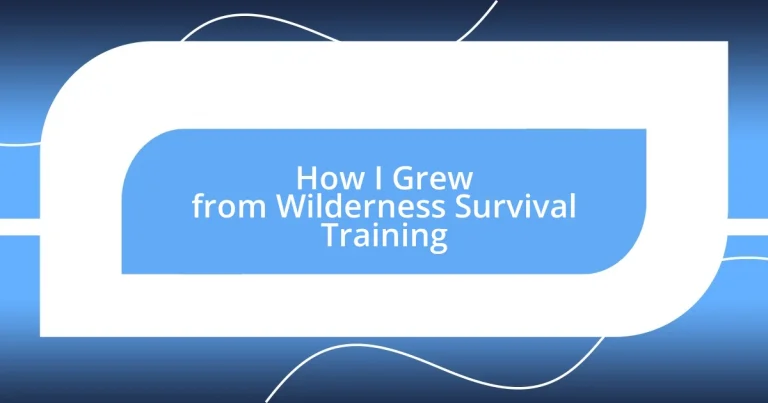Key takeaways:
- Essential survival skills such as shelter construction, water purification, and navigation are fundamental for building confidence and self-reliance in the wilderness.
- Community and networking through survival training foster camaraderie, trust, and shared knowledge, enhancing overall learning experiences.
- Real-life survival experiences emphasize the importance of adaptability, mental resilience, and resourcefulness in overcoming challenges both in the wild and in everyday life.
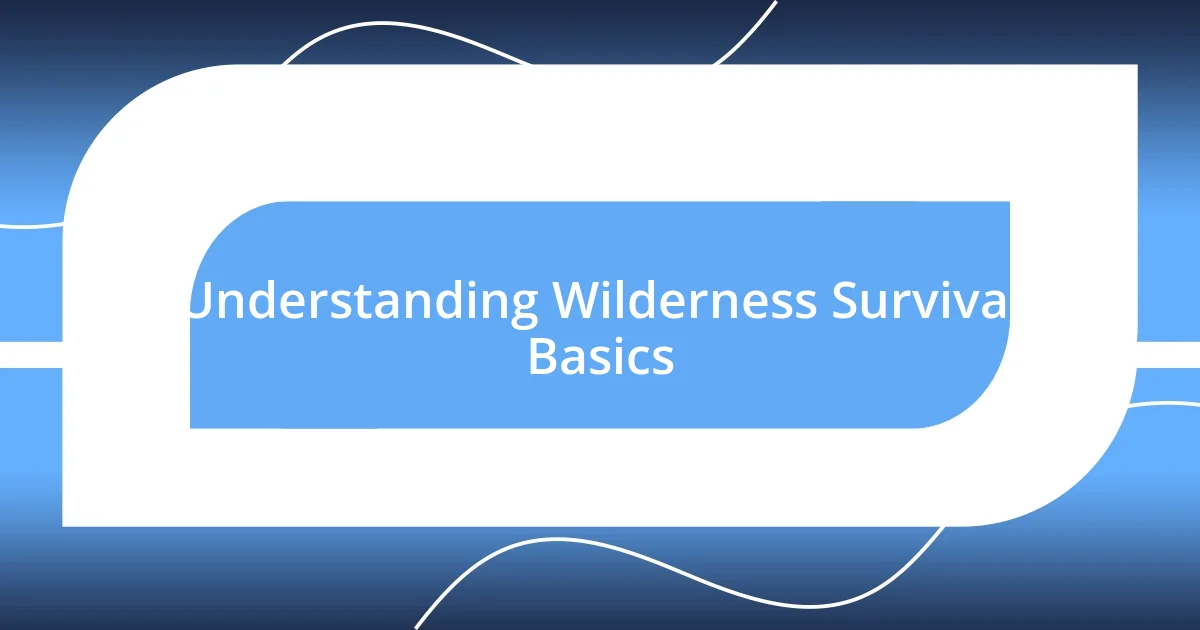
Understanding Wilderness Survival Basics
Wilderness survival is rooted in a few essential skills that can mean the difference between life and death. When I first ventured into the wild, the sheer enormity of my surroundings felt both exhilarating and daunting. Have you ever stumbled upon a vast forest, feeling both lost and connected to nature at the same time? That’s where I learned the importance of understanding the basics, like building shelter, finding food, and purifying water. It might seem overwhelming at first, but each skill you master builds your confidence and capability.
One of the simplest yet most crucial aspects is firecraft. I can still remember my first attempt at starting a fire using flint and steel; it was as frustrating as it was enlightening. I wondered if I’d ever get it right. But when that first spark caught the tinder, the rush of accomplishment was indescribable! It reminded me that the basics are not just tasks; they’re empowering milestones in our journey towards self-reliance and resilience.
Navigation is another key element. I recall an afternoon lost in a thick canopy, when my compass felt like it was mocking me. It pushed me to attentively read my map, not just rely on technology. Have you ever felt that surge of clarity when you finally understand your surroundings? Learning to read nature’s signs—the position of the sun, the growth of moss—gave me a profound connection to the wilderness and made me realize how intuitive survival can be. Understanding these basics is not just about survival; it’s about forming a bond with the wild world around us.
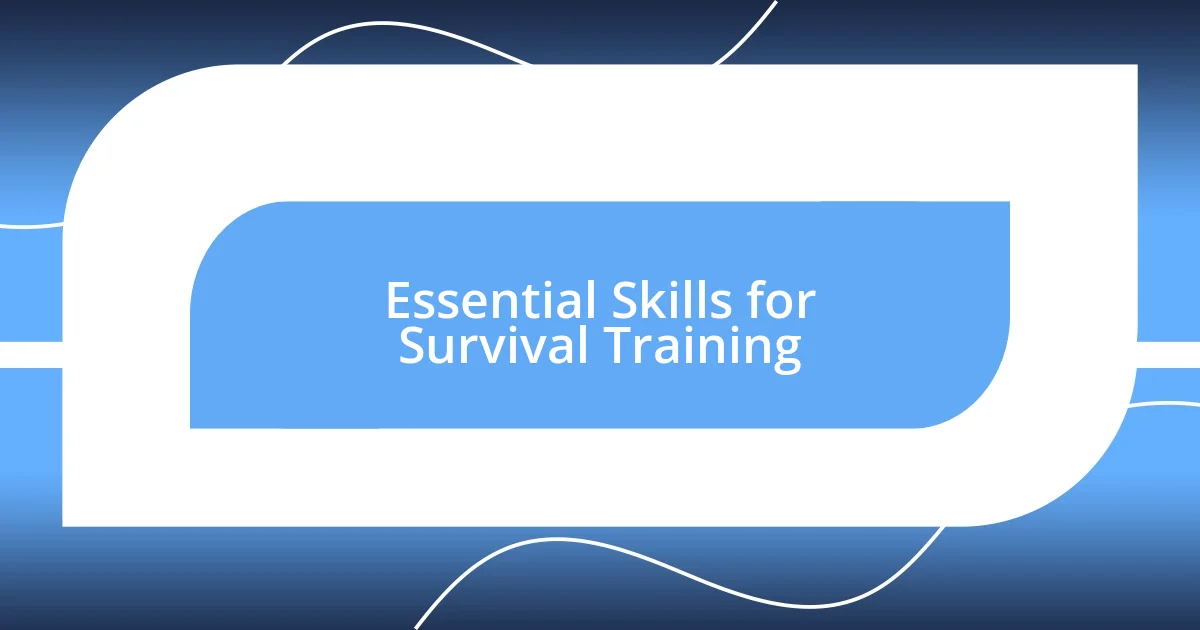
Essential Skills for Survival Training
Survival training requires a set of core skills that help you thrive outside your comfort zone. One skill I found particularly valuable is foraging. The first time I confidently identified edible plants, it felt like unlocking a secret level in a game. I can vividly recall munching on wild berries while knowing I was nourishing my body, reconnecting with the land around me. That simple act transformed my perspective on food—I learned that sustenance is everywhere, waiting to be discovered.
Here are essential skills that every survivalist should focus on:
- Shelter construction: Building a secure shelter to protect against the elements.
- Water purification: Knowing how to safely drink water from natural sources.
- Firecraft: Mastering various methods to start and maintain a fire.
- Foraging: Identifying nutritious plants, berries, and fungi in the wild.
- Navigation: Using maps, compasses, and natural indicators to find your way.
- First aid: Understanding basic medical skills to treat injuries and ailments.
Each of these skills builds a layer of confidence that can turn a wilderness experience from intimidating to empowering.
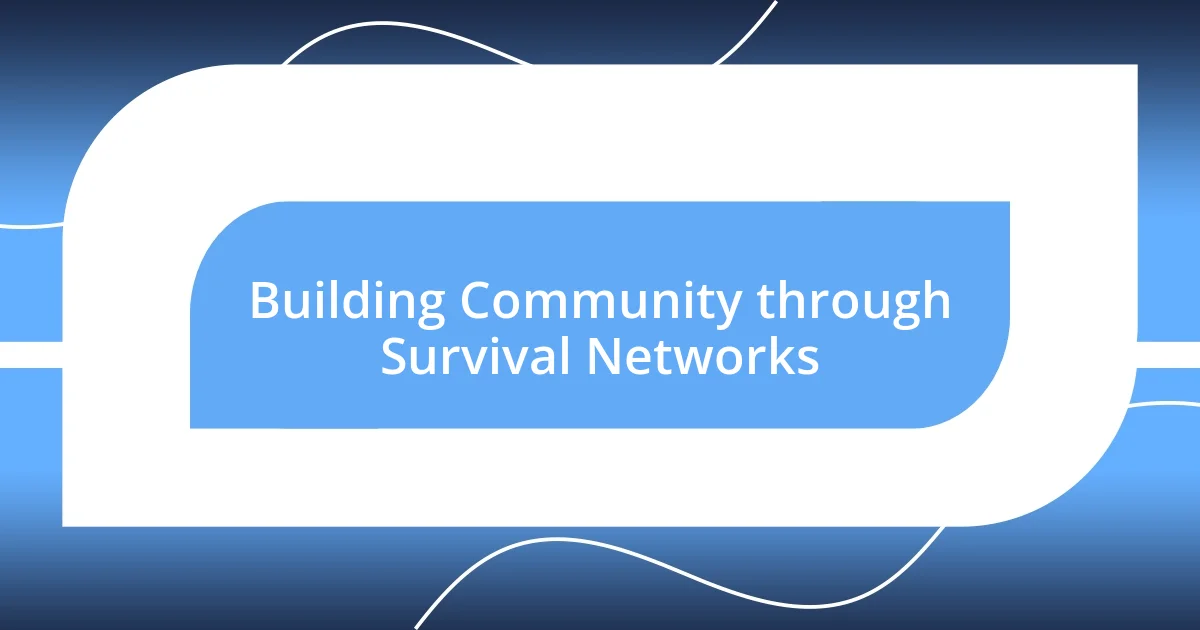
Building Community through Survival Networks
Building a community through survival networks is one of the most rewarding aspects of my training. I remember my first group outing; it was incredible to share knowledge around a campfire. Have you ever experienced that sense of belonging while exchanging survival tips? It was there that I realized we all bring unique skills and perspectives to the table. The camaraderie formed during those moments is unparalleled, reminding me that survival isn’t just about individual knowledge but also about the bonds we create as we learn from one another.
In a survival network, each connection deepens our resources. I’ve seen members help each other reinforce skills like shelter building or foraging. It’s not just about demonstrating techniques; it’s about building trust. When we practice together, we forge strong relationships that can be relied upon in challenging situations. The feeling of having a supportive community behind you has given me immense confidence in my abilities. It’s a silent promise that, should anything go wrong, I won’t be alone.
When we come together through shared experiences, that’s when true learning happens. I fondly recall participating in a weekend retreat where not only did we work on our skills, but we also shared stories of our toughest survival challenges. The laughter, the learning, and the encouragement were invigorating. I truly believe these networks foster a culture of resilience that extends beyond survival training; they shape lifelong friendships and create an environment where everyone grows together.
| Key Elements | Personal Experience |
|---|---|
| Trust Building | Sharing skills fosters a deep trust. I felt supported knowing others were there for me. |
| Networking | Connecting with others expanded my knowledge base—a friend taught me to identify valuable medicinal plants. |
| Shared Learning | Exchanging stories and laughter while practicing kept me engaged and motivated. |
| Camaraderie | The sense of community helped alleviate fears and built confidence in my survival skills. |
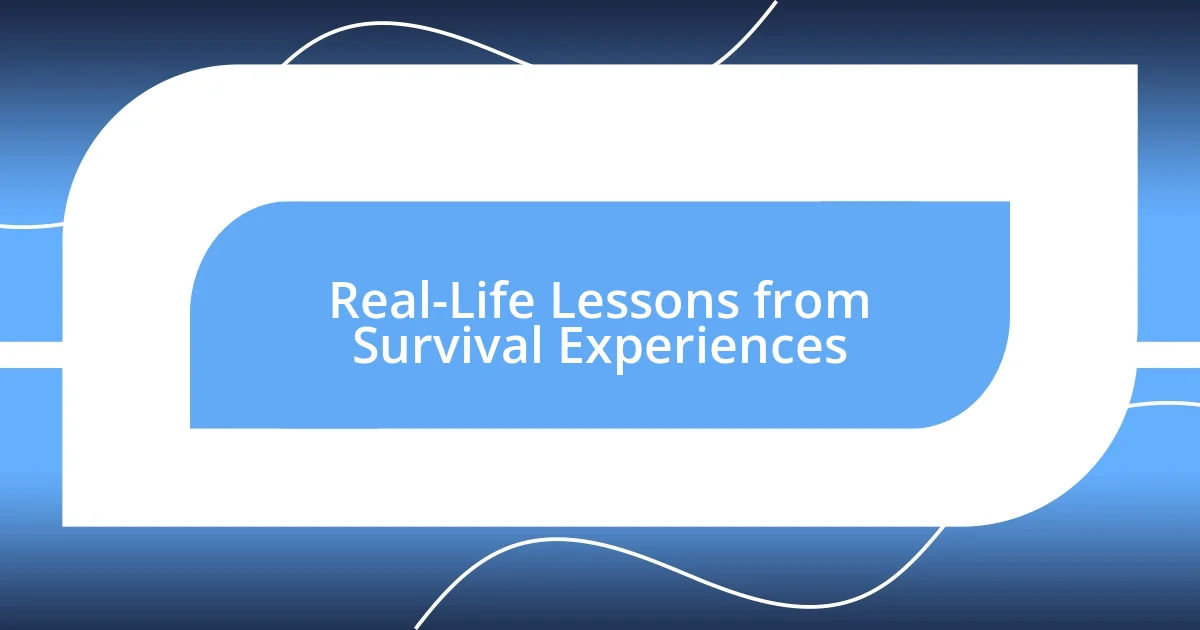
Real-Life Lessons from Survival Experiences
Experiencing survival training taught me that adaptability is crucial, not just in the wild but in everyday life. I vividly remember a night spent in an unexpected rainstorm. My carefully built shelter quickly became a dripping mess. Instead of panicking, I had to think on my feet, repurposing gear and materials to create a new, drier space. This experience reminded me that flexibility in the face of adversity is a powerful lesson we can all apply, whether tackling a difficult project or navigating personal challenges.
One of my most profound realizations came from learning the significance of mental resilience. I often found myself second-guessing my decisions in the wild, but in a particularly tough scenario, I was forced to confront my fears head-on. The feeling of doubt was overwhelming as I faced rugged terrain and dwindling daylight. Yet, pressing onward, I discovered a new layer of strength within myself. Have you ever pushed through a moment of self-doubt and emerged stronger? Those moments in survival training taught me that our minds can be just as vital to our success as our physical skills.
Additionally, I’ve learned the importance of resourcefulness. There was a time when I had to create fire from a few sparks and dry leaves. As I fumbled through that challenge, I focused on the available tools and what nature provided. The exhilaration I felt when the fire finally caught showed me that creativity often lurks in the most unexpected places. This lesson applies to life too—sometimes, it’s about using what you have and believing in your ability to turn obstacles into opportunities.
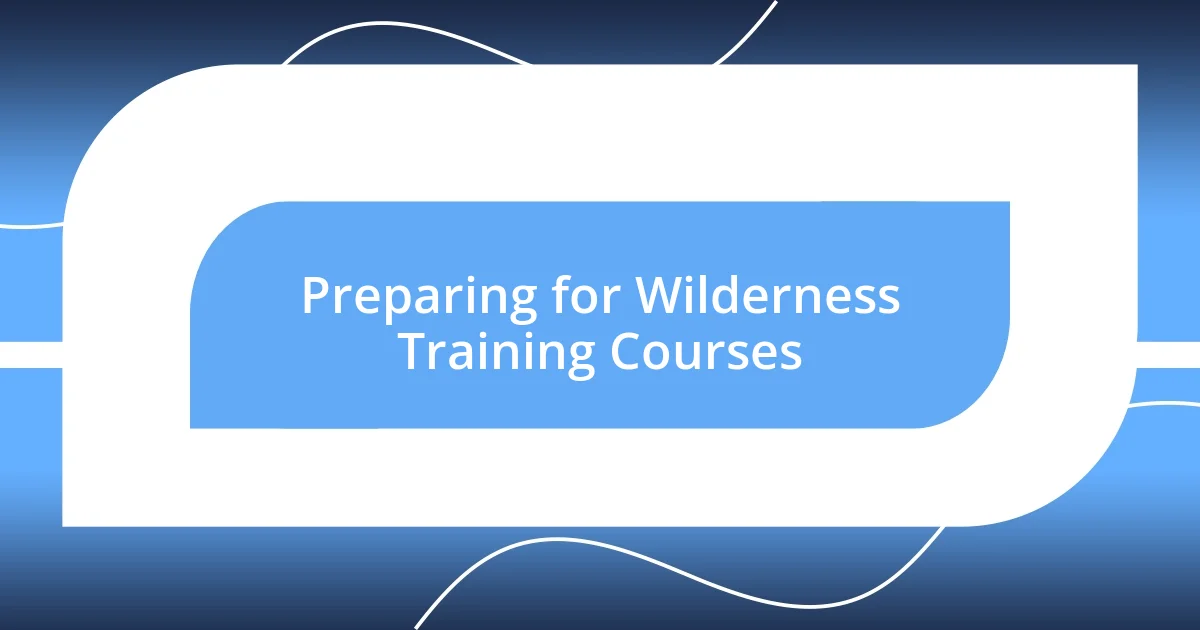
Preparing for Wilderness Training Courses
Preparing for a wilderness training course is an adventure in itself. I remember gathering gear for my first course, feeling a mix of excitement and anxiety. It was eye-opening to realize that the right equipment can make all the difference. Have you ever stood in an outdoor store, overwhelmed by the choices? I certainly did, but I learned that asking seasoned staff for recommendations led me to the essential gear I never knew I needed.
Understanding the physical and mental demands of wilderness training is crucial. I recall my first day on a training hike, my enthusiasm quickly waning as my muscles ached. It dawned on me then that conditioning was vital. Simple exercises, such as hiking with a weighted backpack or practicing yoga for flexibility, became part of my routine leading up to the course. It not only prepared my body but also boosted my confidence. Believe me, there’s nothing quite like feeling fit when tackling the unknown.
Lastly, I can’t stress enough the value of gathering knowledge before you head out. Researching survival techniques and understanding local flora and fauna helped me feel more equipped. I still cherish the moment I identified my first edible plant in the wild; the thrill was unmatched! Have you thought about what you could learn before embarking on your journey? Each morsel of knowledge I picked up transformed my perspective, turning anxiety into anticipation and ensuring I was ready for whatever nature threw my way.






